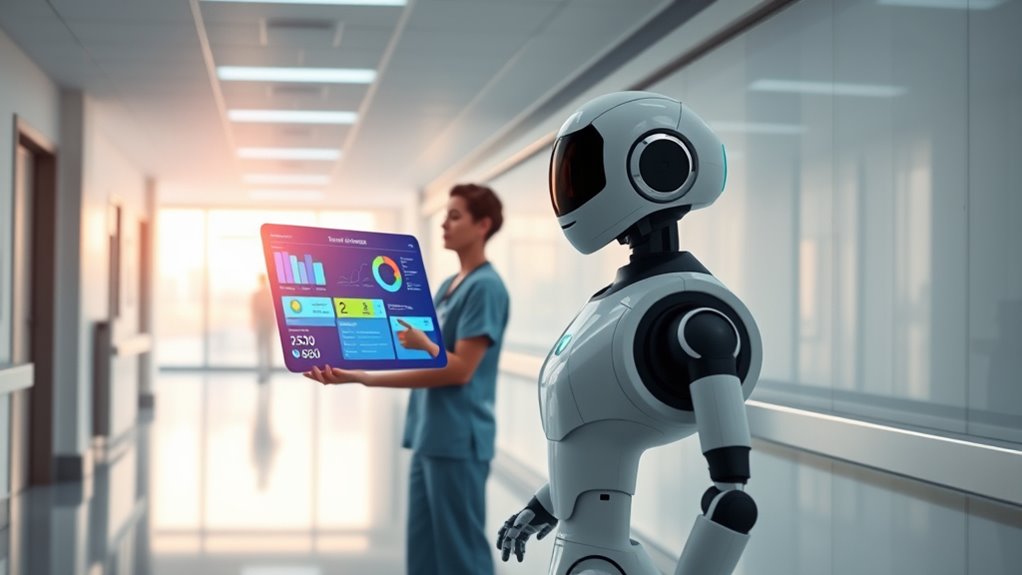Northeast Georgia Health System is using AI tools like DAX Copilot integrated into Epic to help reduce clinician burnout. These solutions automate tasks like drafting notes and capturing conversations, freeing up more time for patient care and reducing screen fatigue. By simplifying workflows and improving accuracy, the AI system aims to boost clinician satisfaction and work-life balance. To discover how these innovations are transforming healthcare, keep exploring how AI is making a difference.
Key Takeaways
- NGHS uses AI tools like DAX Copilot to reduce clinicians’ documentation time and screen fatigue.
- Over 480 clinicians have been trained in AI integration across the health system.
- AI-powered features such as real-time draft notes and ambient conversation recording streamline workflows.
- Collaborations with Microsoft enhance AI capabilities, improving clinician control and efficiency.
- AI adoption aims to lower stress, improve work-life balance, and boost clinician engagement and retention.

Northeast Georgia Health System (NGHS) is leveraging artificial intelligence to combat clinician burnout and improve patient care. By integrating AI tools like DAX Copilot, NGHS aims to lighten clinicians’ administrative burdens, allowing you to focus more on patient interaction. Over 480 clinicians have been trained on DAX Copilot during an enterprise-wide deployment, highlighting the system’s broad adoption. These AI solutions are embedded directly within Epic’s electronic health record system, capturing conversations automatically between you and your patients. This means draft clinical notes are generated in real-time, reducing the time you spend on documentation and cutting down on screen fatigue. The goal is to give you more quality time with your patients and less time buried in paperwork. Integration of AI tools has been shown to improve documentation accuracy and consistency, further supporting clinical decision-making. Additionally, the use of advanced algorithms enhances the system’s ability to adapt to individual workflows and preferences. The impact on your workload is significant. AI tools have been shown to decrease cognitive strain and time constraints, helping you manage your responsibilities more efficiently. The reduction in documentation time enhances your work-life balance, which can improve your overall engagement and job satisfaction. NGHS leadership recognizes that this technological shift is crucial for retaining current staff and attracting new talent, creating a more sustainable work environment. By streamlining workflows with AI, you experience less stress, which can translate into better patient care.
Specific functionalities, like ambient recording of clinical conversations, make documentation easier by auto-generating draft notes. Integration within Epic ensures seamless workflow and minimizes manual entry errors. Additionally, the Wave 2 of Epic’s early-adopter program focuses on ambient ordering, further simplifying your daily activities. Collaborations with Microsoft’s Dragon products enhance these AI tools, ensuring continuous improvements tailored to your needs. These innovations increase your control over your schedule and workload, empowering you to deliver higher-quality care while reducing burnout risks.
However, it’s important to recognize that AI’s role in healthcare isn’t without challenges. While AI can help lessen repetitive tasks, some studies reveal increased stress in complex cases due to added interpretation time. Your acceptance and understanding of these tools are critical for their success. Proper integration is key to balancing efficiency with maintaining your clinical skills and job satisfaction. Overall, NGHS’s strategic AI deployment aims to foster a healthier, more sustainable working environment, benefiting both clinicians and patients alike.
Top picks for "join fight against"
Open Amazon search results for this keyword.
As an affiliate, we earn on qualifying purchases.
Frequently Asked Questions
How Does AI Specifically Identify Signs of Burnout Among Staff?
You can see AI identifying burnout signs by monitoring work hours, task delays, and communication patterns for stress indicators. It analyzes emotional tone in emails and chats, tracks physiological data like heart rate and sleep quality from wearables, and assesses workload fluctuations. By combining these signals, AI predicts burnout risk early, allowing you to intervene proactively and support staff well-being before symptoms worsen.
What Privacy Measures Are in Place When Using AI for Staff Monitoring?
Did you know that 87% of healthcare workers worry about privacy when AI monitors their performance? When using AI for staff monitoring, strict privacy measures protect your data. Encryption safeguards information, access controls limit who sees it, and regular audits detect vulnerabilities. Plus, you’re informed about how your data is used, and your rights are respected, ensuring transparency and minimizing privacy concerns while maintaining effective oversight.
Can AI Predict Future Burnout Risks Before Symptoms Appear?
Yes, AI can predict future burnout risks before symptoms appear. It analyzes data like work patterns, feedback, and workload metrics to identify early warning signs, such as excessive overtime or dissatisfaction. By providing real-time insights, AI enables you to take proactive steps, like adjusting staffing or offering wellness programs, so you can prevent burnout before it affects your team’s well-being and performance.
How Have Staff Members Responded to Ai-Driven Interventions?
They say “actions speak louder than words,” and staff responses to AI-driven interventions show that they see real benefits. You’ve likely noticed increased engagement, with many feeling less stressed and more in control of their schedules. They appreciate how AI reduces clerical burdens, helps focus more on patient care, and fosters a supportive environment. Overall, staff members view AI as an empowering tool that enhances their work experience and patient interactions.
What Training Is Provided for Staff to Work Alongside AI Tools?
You receive extensive training to work alongside AI tools, including hands-on sessions, scenario-based exercises, and personalized coaching. You learn how to use features like voice capture and automated documentation within Epic, ensuring accuracy and oversight. The training emphasizes reducing your workload, managing AI outputs effectively, and integrating these tools smoothly into your workflow. Ongoing support and feedback opportunities help you adapt and feel confident using AI to enhance patient care.
Conclusion
By embracing AI, you’re stepping into a new era where burnout doesn’t stand a chance. Just like how the pony express once sped messages across rough terrains, AI now swiftly tackles workload challenges, giving you more time to focus on what truly matters. As you navigate this brave new world, remember that technology is your trusty steed—helping you stay resilient and connected in the fight for better health and well-being.









